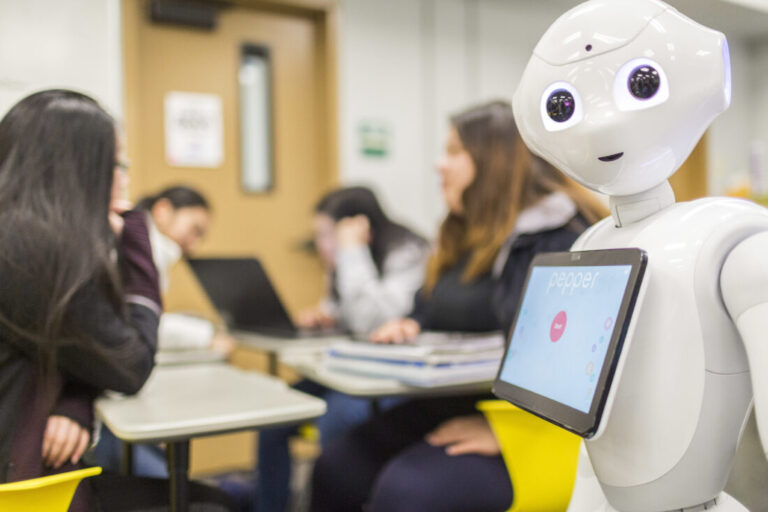
ap photo SoftBank Group is collaborating with SoftBank Robotics America to provide the humanoid robot “Pepper” to students in the San Francisco Unified School District.
Artificial intelligence (AI) continues to advance and is becoming integrated into various aspects of society, including education.
As Marshalltown Community School District officials consider ways to smartly incorporate technology into students’ education, it’s not easy to gauge how prevalent AI is in student learning.
Technology Director Amy Harmsen said she wants to dispel any misconceptions that district devices, such as Chromebooks, have AI built into them.
“We monitor and filter student devices owned by the district,” she said. “We can’t monitor or filter student-owned devices, like cell phones. There’s no way to 100% prevent students from using AI. I’m not sure prevention is what we want to do. We’re trying to pursue a meaningful global future. We want to enable students to be global citizens.”
The district uses a system called GoGuardian to filter Chromebooks, and Harmsen said the district doesn’t allow generative AI categories on the devices. But the internet is so deep, he said, that even GoGuardian’s algorithms can’t block everything.
“We’re not 100% sure that we’ve blocked everything,” Harmsen said. “It’s not our goal to block everything. It’s our goal to give teachers some guidelines on the specific tools that we’ve vetted and then we can start encouraging them to use them.”
While there’s been a lot of attention on the negative aspects of AI, she said it’s important for MCSD to focus on student safety, privacy and data protection.
“I don’t think we’re ready to give specific guidelines yet,” Harmsen said. “We want to communicate the FERPA (Family Educational Rights and Privacy Act) guidelines and make sure we’re following them.”
As a result, she doesn’t tell people that certain websites have been approved yet because there are too many. Websites need to be accessible to all students, accurate, fair, trustworthy, and able to be monitored and protected.
Superintendent Shauna Smith said it’s important for MCSD students to learn how to use technology appropriately.
“For example, if a social studies assignment asks a student about the Civil War and the student copies that question to an AI and then copies and pastes the answer from the AI into the assignment, that’s an inappropriate use of AI,” she says. “They’re essentially using the AI to gather facts and not using the depth of cognitive knowledge. AI allows for higher order thinking. If you’re creating a structure for an essay and want the AI to help you by adding details or finding specific grammatical errors, the AI can provide more sophistication in the assignment.”
Smith said MCSD students have the opportunity to learn quality computer science starting in kindergarten, and district officials are looking into programs that combine coding and AI, which would give students knowledge about how AI and coding work together, Smith said.
“I don’t think there are any other schools in the entire state of Iowa that are considering doing something like this,” Smith said. “We’re in the development stages, figuring out how it could benefit our older kids.”
There’s also an advanced early literacy AI program with evidence-based positive outcomes called EPS Reading Assistance. The state of Iowa has purchased the program and made it available to all school districts. Smith said they’re still learning more about it.
“As students read aloud, we can use AI to adapt and correct them based on their level of fluency,” she said, “and then provide responses and conversations about their understanding of the text.”
Since AI has the power to completely change students’ future career paths, they strive to remain progressive to “prepare students to adapt to any career in the future,” she said.
Given the debate over appropriate use of AI, Harmsen said there are ways to determine if a student has used the technology. In some school buildings, officials are using anti-plagiarism tools to detect AI. Harmsen said he is reviewing which tools the district will add, but that the relationship between teachers and students is the most valuable deterrent.
“Our teachers try to get to know their students, so they know their writing style,” she said. “They know the depth of knowledge of each student. So we ask our teachers to do plagiarism investigations, which they’ve done for years, and there are a lot of times when we think, does this student really know this and write it this way?”
Teachers then fact-check whether students are learning the material, and Harmsen said district policy declares that students will face disciplinary action if they violate the AI’s expectations.
Discipline decisions are made by principals, Smith said.
“AI is growing and we have ongoing conversations internally about how to move forward,” she said.
Smith said educators are trying to figure out the right next steps because technology has become global and can’t be stopped.
“I would ask parents and students to be a little more tolerant as we continue to learn how to work with artificial intelligence,” she said. “Artificial intelligence is here. We know it’s here, and I think it can be a great learning tool if applied correctly.”
Contact Lana Bradstream at 641-753-6611 ext. 210 or lbradstream@timesrepublican.com.
TAMA — There was strong criticism of the initial decision to delay classes by two hours on Monday for the funeral…

